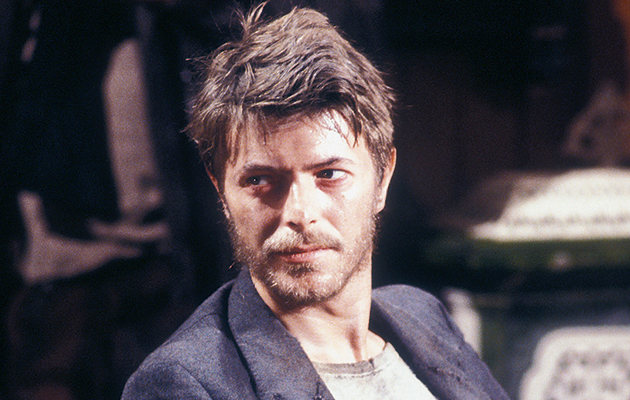On March 2, 1982, just after The Nine O’Clock News ended, viewers to BBC One were greeted with this continuity announcement. “On BBC One now, a star vehicle for a Big Star – Bertolt Brecht’s first character creation, the anarchic genius Baal, is portrayed in tonight’s television presentation by David Bowie…”
If it’s difficult to believe there was once a time when Bowie could turn up on BBC One at 9:25PM on a Tuesday night in a bleak, abrasive adaptation of a difficult 1918 play by Brecht, well, get used to the feeling – or, at least, get used to it if you’re planning going anywhere near Dissent & Disruption, a 13-disc BluRay box (also available as two 6-disc DVD sets) gathering the surviving BBC productions of director Alan Clarke, who died in 1990. These 23 dramas range widely in style and subject, but all leave you wondering that there was ever TV being made like this here. Or, perhaps, wondering why it isn’t anymore. Baal, Clarke’s collaboration with Bowie, is admittedly not the greatest piece here. But it is extraordinary, and, although relegated to a footnote in Bowie’s work, marks a pivotal moment – his last art-for-art’s-sake auf wiedersehen to Berlin and all that.

Baal was Brecht’s first play, and rages with strange, provocative adolescent glee and anger, all angst, spite and bitter humour, while foreshadowing both the fascination with outcasts and the experimental techniques for which he would become famous, not least the use of song and heightened dialogue. The eponymous anti-hero is a filthy, dissolute artist running on schnapps, sex and his all-encompassing loathing of polite Weimar society and its hypocrisies. Blessed with a divine gift for poetry and performance, he’s a user, a manipulator, a self-aggrandising, self-pitying narcissist and all-round bastard – a prototype rockstar, you could argue. We follow him down, from elite salons through sodden barrooms and fetid garrets, through debasement, abuse and abandonment, rape and murder, finally out into the wild uncaring heart of the Black Forest.
When Clarke first conceived of filming the play, in collaboration with Brecht scholar John Willet, he considered Steven Berkoff for the role. It was Willett who suggested Bowie, who, when the programme was recorded in summer 1981, had not long completed his run as The Elephant Man on the American stage. He brings lessons learned there, as well with Lindsay Kemp and, of course, stalking stages as Ziggy and The Duke (plus, it should be said, the beautiful annunciation he brought to his Peter And The Wolf narration).
Clarke mounts the piece with a degree of stylisation that terrifies current British TV. Intercut with abstract split-screen monologues and songs, the cast perform as though in a live performance against huge, detailed sets erected as frieze-like tableaux, the camera usually at a distance – as if, indeed, you were in the stalls viewing a theatre stage. A filthy, snaggletoothed scum-seer, Bowie himself suggests an expressionist woodcut come to life, yet exudes a fitting naturalism the cast around him avoids.
He clearly responded to the project. To mark its broadcast, Bowie decided to cut a 7-inch EP of the five Brecht songs he performs in the drama, acting as his own Greek chorus. In the TV version, he accompanies himself with bare plucks at the banjo he perpetually clutches. For the Baal EP, however, Bowie returned to Germany’s Hansa studio with Tony Visconti and 15 Berlin players, the last time he would record beside the Wall. The record has become a semi-obscure curio, but two songs, “The Drowned Girl” and “Remembering Marie A”, rank among Bowie’s most affecting 1980s recordings. Listening to these and watching his rank, ragged TV characters, it’s astonishing to remember that the next time the world saw him would be “Let’s Dance”.
Deceptively stagebound, Baal may seem uncharacteristic of Clarke, who’s best known for the visceral, prowling “realism” of Scum, Made In Britain (which, made for ITV, is sadly not included) and The Firm. But everything here is united by attitude, anger and irreverence, by an unflinching gaze, a jabbing intensity of style and an explosion of ideas. Next time someone tells you we’re currently living in the Golden Age of TV, think of Clarke, and spit.
EXTRAS: A mouth-dropping array, including hours of Clarke shorts, documentaries, and archive footage, and new contributions from collaborators and fans including Gary Oldman and Danny Boyle.
Uncut: the spiritual home of great rock music.



